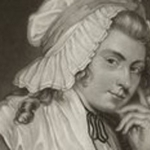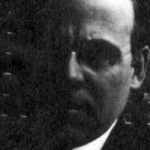Under the French horns of a November afternoon
a man in blue is raking leaves
with a wide wooden rake (whose teeth are pegs
or rather, dowels). Next door
boys play soccer: “You got to start
over!” sort of. A round attic window
in a radiant gray house waits like a kettledrum.
“You got to start . . .” The Brahmsian day
lapses from waltz to march. The grass,
rough-cropped as Bruno Walter’s hair,
is stretched, strewn and humped beneath a sycamore
wide and high as an idea of heaven
in which Brahms turns his face like a bearded thumb
and says, “There is something I must tell you!”
to Bruno Walter. “In the first movement
of my Second, think of it as a family
planning where to go next summer
in terms of other summers. A material ecstasy,
subdued, recollective.” Bruno Walter
in a funny jacket with a turned-up collar
says, “Let me sing it for you.”
He waves his hands and through the vocalese-shaped spaces
of naked elms he draws a copper beech
ignited with a few late leaves. He bluely glazes
a rhododendron “a sea of leaves” against gold grass.
There is a snapping from the brightwork
of parked and rolling cars.
There almost has to be a heaven! so there could be
a place for Bruno Walter
who never needed the cry of a baton.
Immortality—
in a small, dusty, rather gritty, somewhat scratchy
Magnavox from which a forte
drops like a used Brillo Pad?
Frayed. But it’s hard to think of the sky as a thick glass floor
with thick-soled Viennese boots tromping about on it.
It’s a whole lot harder thinking of Brahms
in something soft, white, and flowing.
“Life,” he cries (here, in the last movement),
“is something more than beer and skittles!”
“And the something more
is a whole lot better than beer and skittles,”
says Bruno Walter,
darkly, under the sod. I don’t suppose it seems so dark
to a root. Who are these men in evening coats?
What are these thumps?
Where is Brahms?
And Bruno Walter?
Ensconced in resonant plump easy chairs
covered with scuffed brown leather
in a pungent autumn that blends leaf smoke
(sycamore, tobacco, other),
their nobility wound in a finale
like this calico cat
asleep, curled up in a breadbasket,
on a sideboard where the sun falls.




















Comment form: